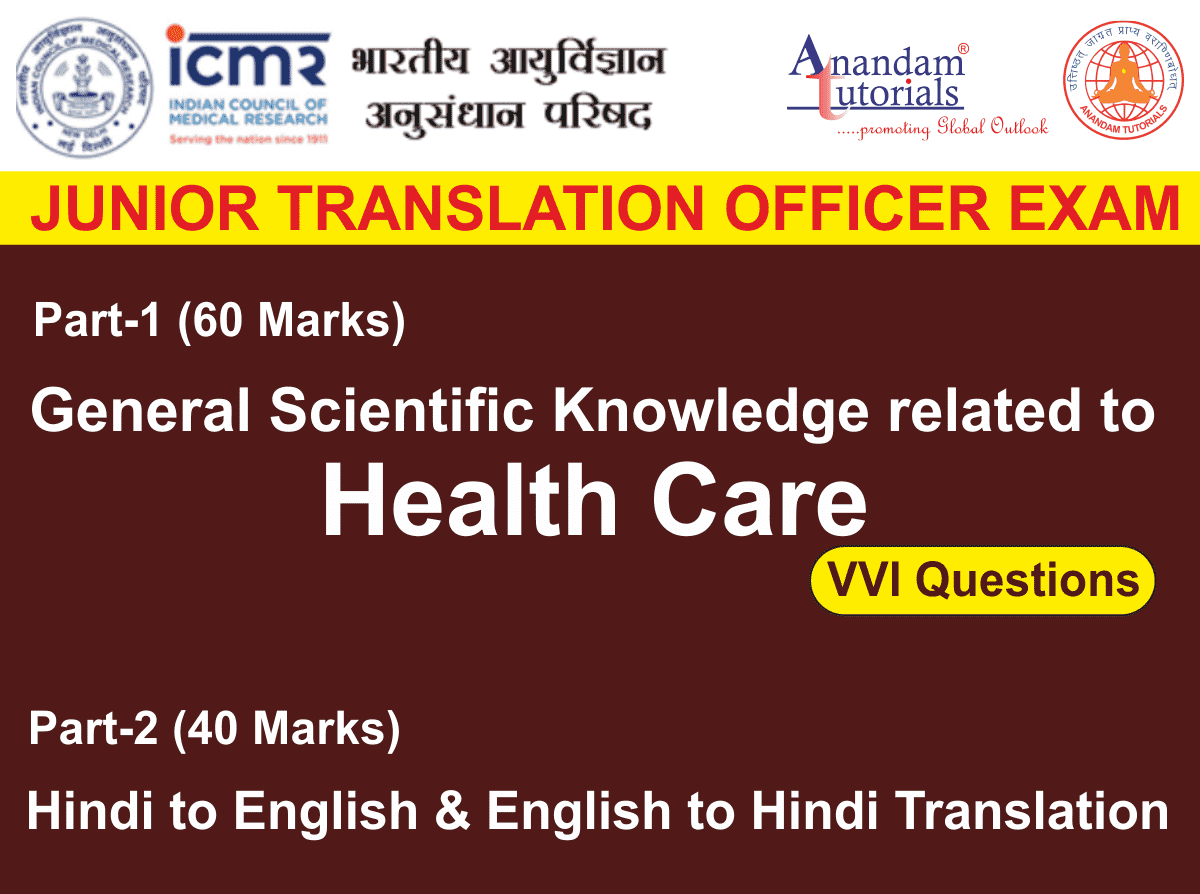The following are a few questions that are very important for recruitment for Junior Translation Officer (JTO) Posts of ICMR (Indian Council of Medical Research (भारतीय आर्युविज्ञान अनुसंधान परिषद). There will be two parts in the written test -
- Part - I (60 Marks) comprising general scientific knowledge related to health care.
- Part - II (40 Marks) comprising translation from English to Hindi and vice versa.
1. What
is the normal body temperature in Celsius?
a) 37°C
b) 38°C
c) 39°C
d) 36°C
Answer: a) 37°C
2. What
is the primary function of red blood cells?
a) Fight infection
b) Carry oxygen
c) Produce antibodies
d) Clot blood
Answer: b) Carry oxygen
3. Which
organ is responsible for filtering blood?
a) Heart
b) Lungs
c) Liver
d) Kidneys
Answer: d) Kidneys
4. Which
vitamin is essential for blood clotting?
a) Vitamin C
b) Vitamin K
c) Vitamin D
d) Vitamin A
Answer: b) Vitamin K
5. Which
is the largest organ of the human body?
a) Liver
b) Skin
c) Brain
d) Lungs
Answer: b) Skin
6. What
does BMI stand for?
a) Blood Mass Index
b) Body Mass Index
c) Bone Mass Index
d) Brain Mass Index
Answer: b) Body Mass Index
7. Which
hormone is responsible for regulating blood sugar levels?
a) Insulin
b) Thyroxine
c) Adrenaline
d) Estrogen
Answer: a) Insulin
8. Which
type of fat is considered healthy?
a) Trans fat
b) Saturated fat
c) Polyunsaturated fat
d) Cholesterol
Answer: c) Polyunsaturated fat
9. What
is the normal pH range of blood?
a) 7.35-7.45
b) 6.8-7.2
c) 7.5-8.0
d) 8.0-8.5
Answer: a) 7.35-7.45
10.
What is hypertension?
a) Low blood pressure
b) High blood pressure
c) High cholesterol
d) Irregular heartbeat
Answer: b) High blood pressure
11.
Which part of the eye is responsible for controlling the amount of light
entering it?
a) Retina
b) Pupil
c) Cornea
d) Iris
Answer: d) Iris
12.
Which mineral is most important for strong bones?
a) Sodium
b) Iron
c) Calcium
d) Potassium
Answer: c) Calcium
13.
What does CPR stand for in healthcare?
a) Cardio Pressure Recovery
b) Cardio Pulmonary Resuscitation
c) Critical Pressure Resuscitation
d) Circulatory Pulmonary Recovery
Answer: b) Cardio Pulmonary Resuscitation
14.
Which disease is known as the "silent killer"?
a) Hypertension
b) Diabetes
c) Cancer
d) Asthma
Answer: a) Hypertension
15.
What does HIV stand for?
a) Human Immune Virus
b) Human Immunodeficiency Virus
c) Hepatitis Infection Virus
d) Highly Infectious Virus
Answer: b) Human Immunodeficiency Virus
16.
Which nutrient is essential for the production of haemoglobin?
a) Vitamin C
b) Iron
c) Magnesium
d) Potassium
Answer: b) Iron
17.
What is the primary function of white blood cells?
a) Carry oxygen
b) Fight infection
c) Produce antibodies
d) Clot blood
Answer: b) Fight infection
18.
What is the most common symptom of a heart attack?
a) Back pain
b) Chest pain
c) Leg cramps
d) Headache
Answer: b) Chest pain
19.
What is a common risk factor for Type 2 diabetes?
a) Being underweight
b) Smoking
c) Obesity
d) Low cholesterol
Answer: c) Obesity
20.
Which type of sugar is naturally found in fruits?
a) Sucrose
b) Fructose
c) Glucose
d) Lactose
Answer: b) Fructose
21.
Which of the following diseases is spread by mosquitoes?
a) Influenza
b) Tuberculosis
c) Malaria
d) Meningitis
Answer: c) Malaria
22.
What does ECG stand for?
a) Electrocardiograph
b) Electroencephalograph
c) Electrolyte Conductivity Graph
d) Electrocardiogram
Answer: d) Electrocardiogram
23.
Which is the main component of the human brain?
a) Bone
b) Muscle
c) Fat
d) Water
Answer: d) Water
24.
Which organ stores bile?
a) Liver
b) Gallbladder
c) Pancreas
d) Stomach
Answer: b) Gallbladder
25.
What is the term for high blood sugar?
a) Hypoglycaemia
b) Hyperglycaemia
c) Glycosuria
d) Insulinemia
Answer: b) Hyperglycaemia
Courses Available. Install our Application from Google Play Store
